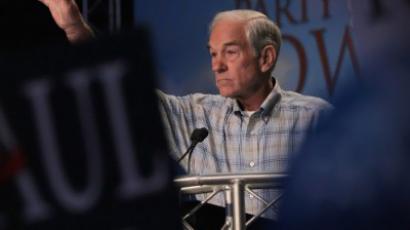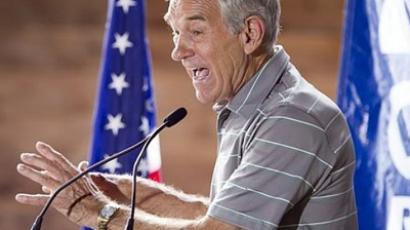Ron Paul stands tall at GOP debate
Despite what the mainstream media reports, congressman and presidential candidate Ron Paul is closing in on the Republican frontrunners as his odds of coming out on top for the GOP nomination becomes more and more likely.
In a new poll conducted by CNN, the congressman from Texas placed only six percentage points behind second place candidate Mitt Romney, with 12 percent of over 1,000 American adults surveyed saying they are most likely to vote for Rep. Paul. In that study, pollsters asked Americans to consider a race where former vice presidential candidate Sarah Palin would be included in the race. While Palin remains a favorite among Tea Partiers, she has not formally announced her candidacy. The latest poll from CNN, conducted in the few days leading up to September 11, 2011, shows that Paul has managed to double his support since the last survey conducted by the cables news network only two weeks earlier. His success still puts him behind frontrunner and Texas Governor Rick Perry, but comes as a surprise to the many in the mainstream that have played Rep. Paul off as a fringe candidate seemingly unlikely to secure the Republican nomination. In a race where Palin is not a possible candidate, the 1,038 adults polled put Paul as the third-most likely choice for president, behind Perry and Romney, but with nearly double the support of what was awarded to Michele Bachmann and Newt Gingrich.At Monday night’s GOP debate, Paul managed to get the attention of the Tea Party crowd with quite a few ideas of his — some more popular with the audience than the others. When quizzed by moderator Wolf Blitzer on his take on defense spending, Paul pushed his plan to reconsider America’s foreign policy and said that he believes that the military could be posed with spending cuts, but that defense should not. “You could slash the military spending,” said Paul. “We don’t need to be building airplanes that were used in World War 2. We’re always fighting the last war.”Paul added that America’s problem with military spending lies in the fact that the USA has placed itself on far too many war fronts. “We're under great threat because we occupy so many countries,” he said. “We’re in 130 countries. We have 900 bases around the world. We are going broke!”While Paul’s responses garnered applause throughout the debate, his chastising of American foreign policy in relation to the September 11 terrorist attacks caused an uproar of jeers from the crowd at one point. When challenged by Rick Santorum for being “irresponsible” in saying that the actions of the US government served as catalyst for 9/11, Paul defended himself by condemning again America’s military actions abroad.Paul attempted a response by retorting, “Osama bin Laden and al-Qaeda have been explicit and they wrote and said that ‘We attacked America because you had bases in our holy land in Saudi Arabia, you do not give Palestinians a fair treatment,’” though the congressman’s explanation was cut short by boos from the pals of Perry, who attests that the 9/11 attacks resulted because the American way of life is “antithetical to the civilization of the jihadists.”Paul responded by telling the crowd, “We have been bombing and killing hundreds of thousands of Iraqis for ten years. Would you be annoyed? If you’re not annoyed then there is some problem.”The congressman also added that as long as Americans believe that terror attacks are assaults on the freedoms of America, “we’re going to be under a lot of danger.”Investigative journalist Gareth Porter tells RT that Santorum received such strong backing for his scrutinizing of Congressman Paul because “what Santorum said is the official line of not just the US government but more concretely the national security part of the government.”“Unless you take the position that the threat of terrorism — including 9/11 —has nothing to do with US military presence in the Middle East or wars that the US fights on the soil of Islamic countries, then you’re going to have a problem justifying the policy,” adds Porter.














